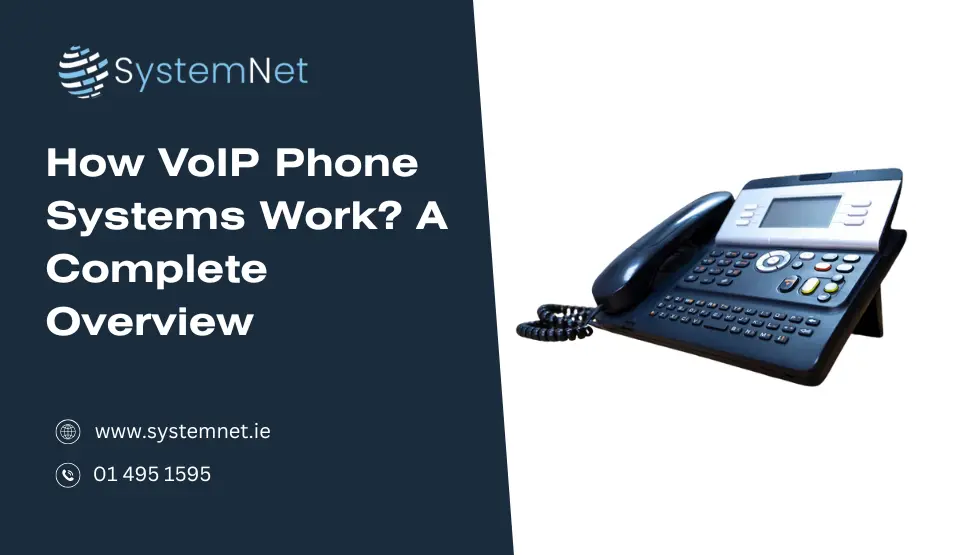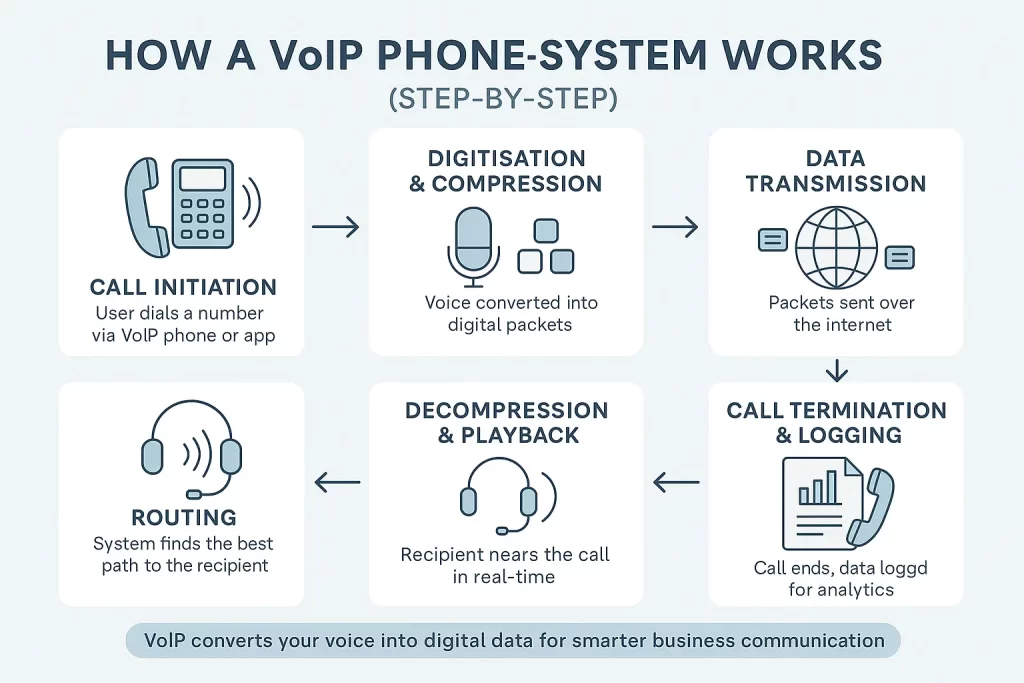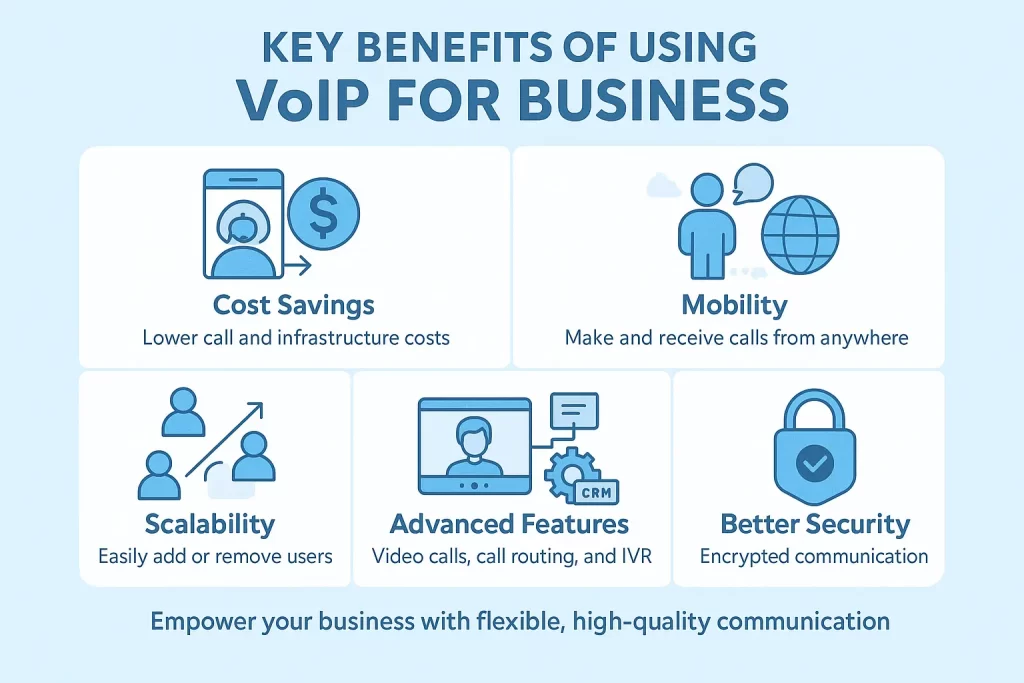A VoIP phone system allows users to make and receive calls from anywhere with an internet connection. Unlike traditional telephones that rely on a public switched telephone network (PSTN), VoIP technology converts your voice into digital signals, sending them across an IP network.
This guide by SystemNet explains how VoIP works, its benefits, and everything you need to make an informed decision for your business in Ireland.
What Is a VoIP Phone System?
A VoIP (Voice over Internet Protocol) phone system is a modern communication method that replaces traditional telephones. Instead of relying on analogue phone lines, VoIP systems transmit voice calls, video conferencing, and other data over a high-speed IP network. Businesses can use IP phones, softphones, or mobile apps, making VoIP a cost-effective solution with flexibility and scalability.
- Converts analogue voice into digital data
- Works over high-speed internet or private IP networks
- Supports voice calls, video conferencing, and messaging
- Can integrate with existing business software
How VoIP Phone Systems Work: Step by Step
Understanding how a VoIP phone system works can seem complex, but it can be broken down into clear steps. This helps business owners and decision-makers grasp the technology behind real-time voice calls.
1. Call Initiation
Every VoIP call begins with call initiation. The user dials a phone number using a VoIP phone, softphone, or mobile app. The system uses Session Initiation Protocol (SIP) to establish a connection between the caller and recipient. SIP is a signalling protocol that manages call setup, control, and termination.
- The dialled number is converted into an address on the IP network
- SIP checks the availability and readiness of the receiving device
- Call initiation is nearly instant over a high-speed network
2. Digitisation & Compression
Once the call is initiated, the analogue signals from your voice are converted into digital data. This process is called digitisation. The system also compresses the data to reduce bandwidth usage while maintaining call quality.
- Converts analogue phone signals into digital data packets
- Compression ensures efficient use of the internet without loss of clarity
- Real-time processing is essential for smooth communication
3. Data Transmission
The compressed digital data is transmitted across the IP network. Unlike traditional telephones, which send signals over the public switched telephone network (PSTN), VoIP calls travel as packets over the Internet.
- Data travels through routers, switches, and servers
- High-speed internet improves call quality and reduces delays
- Voice packets can traverse multiple networks to reach the recipient
4. Routing
Routing ensures the digital packets reach the correct destination. The system examines the recipient’s IP address and determines the optimal path across the network.
- Uses IP addresses to identify the recipient device
- Can route calls locally, nationally, or internationally
- Intelligent routing reduces delays and packet loss
5. Decompression & Playback
Once the packets reach the recipient, they are decompressed and converted back into analogue signals or digital audio, depending on the receiving device. This allows the recipient to hear your voice in real-time.
- Ensures accurate reproduction of voice
- Supports IP phones, softphones, and mobile apps
- Critical for maintaining call clarity during video conferencing
6. Call Termination & Logging
After the conversation ends, the call is terminated and logged for record-keeping. VoIP systems can provide analytics, call duration, and quality metrics.
- Logs help businesses track usage and performance
- Can integrate with CRM or call management tools
- Supports compliance with business communication regulations
Key Features of Modern VoIP Systems
Modern VoIP systems offer far more than just voice calls. Features include:
- Two-way voice and video calls for remote collaboration
- Video conferencing and screen sharing
- Call forwarding and routing to multiple devices
- Interactive Voice Response (IVR) for automated call handling
- Integration with business tools like CRM software
- Call recording and analytics for quality assurance
- Secure communication through encryption and firewalls
These features make VoIP technology a flexible and scalable phone system for businesses of all sizes.
Benefits of Using VoIP
VoIP systems provide several advantages over traditional telephones:
- Cost-effective: Reduces call and infrastructure costs
- Mobility: Users can make and receive calls from anywhere with an internet connection
- Scalability: Easy to add or remove users as business needs change
- Advanced features: Supports video calls, conference calling, and messaging
- Integration: Can connect with business apps and CRM systems
- Improved call quality: High-speed internet and packet routing improve clarity
VoIP is not just a replacement; it is an upgrade that enhances communication capabilities for businesses.
Challenges & Considerations
While VoIP is highly effective, there are factors to consider before adoption:
- Internet reliability: High-speed internet is critical for uninterrupted calls
- Call quality issues: Jitter, latency, and packet loss can affect communication
- Security risks: VoIP systems must be protected against hacking and eavesdropping
- Hardware and software: IP phones, adapters, and compatible devices are necessary
- Power dependency: Unlike traditional phones, VoIP relies on electricity and internet connectivity
Understanding these considerations helps businesses make informed decisions when choosing a VoIP phone system.
VoIP vs Traditional Phone Systems: Quick Comparison
Feature |
VoIP |
Traditional Landline |
| Cost | Low / subscription-based | Higher / per line |
| Mobility | Anywhere with internet | Fixed location |
| Features | Video conferencing, call routing, IVR | Basic voice calls |
| Setup | Quick & scalable | Complex & costly |
| Integration | CRM & business apps | Limited or none |
| Maintenance | Cloud updates | Hardware-dependent |
This table highlights why VoIP technology is rapidly replacing traditional telephones for businesses.
Common Use Cases of VoIP
VoIP phone systems are suitable for various business scenarios:
- Small businesses: Reduce costs and simplify communication
- Remote and hybrid teams: Connect employees in multiple locations
- Customer support centres: Use advanced routing and call management
- International communication: Affordable calls across countries
- Businesses requiring video conferencing: Teams can collaborate in real-time
Things to Consider Before Choosing a VoIP Phone System
Before adopting a VoIP system, consider:
- Internet speed and reliability – Essential for uninterrupted voice calls
- Required features – Video conferencing, call forwarding, IVR, etc.
- Scalability – Can the system grow with your business?
- Security – Encryption and secure IP networks are vital
- Compatibility – Ensure IP phones, softphones, and existing systems work together
These points help business owners make a well-informed choice without trial and error.
Best VoIP Services Provider in Ireland: SystemNet Communications
Looking for a reliable VoIP phone system for your business in Ireland? SystemNet Communications Ltd. provides secure, high-quality VoIP solutions designed to enhance communication, reduce costs, and improve productivity.
Get in touch today to explore options and find the perfect system tailored to your business needs.
Key Takeaways
- VoIP sends voice as digital data over IP networks.
- Supports calls, video, and messaging, unlike traditional phones.
- Features include call routing, IVR, and CRM integration.
- Offers cost savings, flexibility, and easier communication.
- Understanding VoIP helps businesses make smarter decisions.
FAQs
1. Can VoIP replace my existing phone system?
Yes, but ensure high-speed internet and compatible devices are in place.
2. Do I need special hardware for VoIP?
You can use IP phones, adapters, or softphone apps on existing devices.
3. Is VoIP secure?
With encryption and secure networks, VoIP can be highly secure.
4. Can I make international calls?
Yes, VoIP is ideal for affordable international calls.
5. Does call quality depend on the internet?
Yes, high-speed, reliable internet ensures clear, real-time voice calls.



